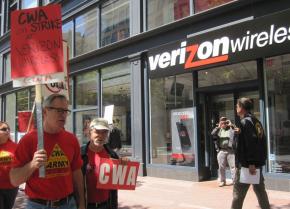What’s next at Verizon?
A member of CWA Local 1106 reports on the reaction among fellow Verizon workers to a deal that ended their strike without a new collective bargaining agreement.
THE ANNOUNCEMENT August 20 that the 45,000 striking members of the Communication Workers of America (CWA) and the International Brotherhood of Electrical Workers (IBEW) would be returning to work without a contract at Verizon after two weeks on the street was met with mixed emotions by workers.
While many union members assumed there must be real progress at the negotiating table--interpreting CEO Lowell McAdam's request for a "fresh start" to mean that the 100 retrogressive demands of management would be removed--the mood turned to anger and disbelief as management made it clear that no such progress had been made.
Company spokesman Marc Reed told the New York Times: "The company hasn't conceded any of its proposals...At the end of the day we still have health care on the table. We still have proposals on job security and moving work on the table."
Now the unions are facing the challenge of maintaining momentum both on the shop floor and in the public.
Unique to this strike, and visibly affecting the confidence of the company, were the pickets and actions at Verizon's highly profitable Wireless stores. While the back-to-work agreement signed by both sides ended pickets at wireline work locations, no mention was made of Verizon Wireless stores.

Unfortunately, within hours of the signing of the agreement, the union and its supporters in Jobs with Justice called for an end to actions targeting the stores. This was a blow to the momentum of solidarity activists who were looking to keep the struggle alive.
Fortunately, the unions and Jobs with Justice reversed themselves five days later, calling for continuing action at Verizon Wireless locations, with a leaflet for supporters to use. In addition, locals are supposed to initiate actions at stores in their areas. Given that the return-to-work agreement ended all injunctions, these actions could again capture the anger and energy of the strike.
ON THE job, the unions are rightly focusing on doing quality work while clearing the enormous backlog of repairs and installation orders. Given the company's rigorous work rules, some activists have called for work-to-rule campaigns to frustrate the company's attempt to rush through the workload.
Work-to-rule campaigns are potentially very effective. But they can be difficult to organize, since the collective strength of the picket line is diffused, and managers follow, observe and harass individual workers, goading them to work faster despite safety and quality concerns.
When on strike, the picket line keeps people unified. At Verizon, we all face the jeers, rude gestures and bullying by managers. Back at work, managers have the ability to bribe and threaten to get their way. And they've already started playing favorites in order to divide and conquer.
As part of the back-to-work deal, the company was granted the right to exceed the contractual maximum of 15 hours a week of overtime for the first week back. Instead of forcing the maximum in many locations, however, in New York, the company seemed to be doling out overtime as favors to those who were cooperating and working as fast as management wanted.
The company is clearly attempting to avoid an out-and-out confrontation now that we are back in the door. Instead, management wants to take the steam out of any effort to impact negotiations with our productivity.
But the bitterness over losing 11 days of pay and having no movement on the contract may not disappear over a couple hundred dollars worth of overtime. In many locations, union members returned to work wearing union T-shirts, not the required uniforms (thereby risking being sent home without pay) as an indication that it's not business as usual.
How this will play out is not written in stone. Active campaigns inside the shop, paired with pickets that management worries "damage the brand" by making Verizon the new Wall Street of corporate criminals, could create the climate for a better settlement.
The money for a decent contract is there. Verizon is making money hand over fist, and with fiber optic installations gearing back up, the company is profitable in all its divisions. There is no reason for any concessions. That will be much harder to win without going out for a prolonged strike. But that might be what it takes.
One member of CWA Local 1106 wrote a public letter to CWA District 1 Vice President Chris Shelton to express the anger many of us felt:
Why are we returning to work without the well-being and safety of all our members being secured first? How can you ask us to go in to work under these conditions? Did you think we were not prepared to strike until the end? We were prepared, and we are writing to again offer our vote of confidence in the power of striking against Verizon. We believe in showing an absolute resolve to win. That means "NO CONTRACT, NO WORK!"


